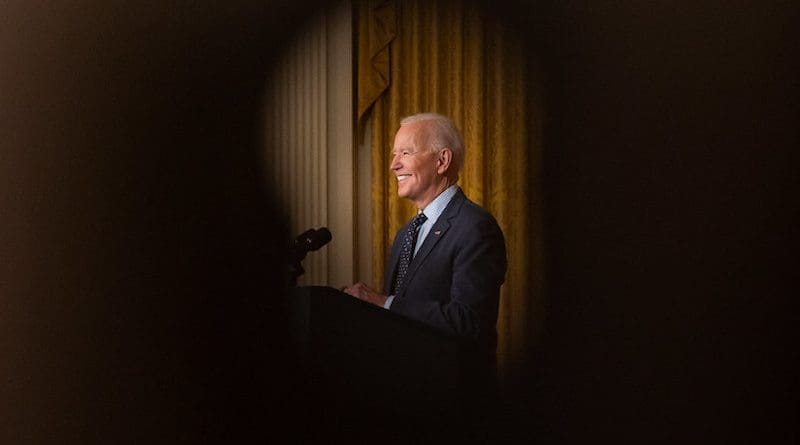‘Leader Of The Free World’ Must Step Up And Prove It – OpEd
By Arab News
By Dalia Al-Aqidi*
While the US discusses with Iraq the future of their partnership and cooperation in the global war against terrorism, and Washington continues its negotiations with Iran to revive the 2015 Joint Comprehensive Plan of Action (JCPOA), several important events are taking place in this troubled region.
The Islamic Revolutionary Guard Corps intelligence chief Hossein Taeb led a delegation to Iraq this month to meet not government officials but the leaders of pro-Iran armed factions. Taeb gave clear orders to the Iraqis to continue their attacks on US targets in Iraq until the departure of the last American soldiers.
At the same time, these groups continue to assassinate Iraqi activists. Demonstrations in Baghdad and other southern provinces demanded the end of impunity, and punishment for the entities that gave orders to abduct and kill more that 70 activists and hundreds of peaceful protesters since the anti-corruption and pro-democracy movement swept Iraq in October 2019.
Despite these calls, the world has mostly chosen to ignore their suffering.
Meanwhile, across the border in Iran, protests erupted in the southwestern Khuzestan province over the extreme water shortage. Soon enough, the demand for water changed to bigger political demands, spreading to different locations including the capital, Tehran.
The oil-rich Khuzestan province is home to Iranian Arab minorities who have faced oppression and discrimination by the regime in Tehran, which has not hesitated to use deadly force against the protesters; 10 have been killed and more than 100 detained, while Iranian officials and state-run media claim “foreign interference.”
Iran’s supreme leader Ayatollah Ali Khamenei urged his people to be cautious. “The enemy will try to use any tool against the revolution, the nation, and the people’s interests, so we must be careful not to give him any pretext,” he said.
Once again, there was no sign of a significant reaction from the international community.
On several occasions, the people of Iran have tried to show the world the brutality of their own regime but they have been failed by the very same countries that stand against oppression and human rights violations — including the US, whose own constitution starts with three simple words: “We the People …”
How many more people must die for the international community to react? How many children need be orphaned for the world to take action? What should oppressed people do, other than to die, to make their voices heard?
Instead of begging the Iranian regime and waiting for its blessing to come back to the negotiating table, the US should take firm measures to stop the Iranian atrocities on its own soil and elsewhere.
What the Iranian regime is doing at home and in Iraq, Syria, Yemen, and Lebanon should not go unnoticed and without any serious consequences. From a humanitarian perspective, people’s suffering should not go unnoticed.
The White House continues to echo British Prime Minister Boris Johnson’s statement at the Munich security conference in February, when he said President Joe Biden had restored the US as leader of the free world and helped the West to reunite. Later, after the G7 summit in England, US national security adviser Jake Sullivan proudly declared: “I really do not believe that it is hyperbole to say that the president of the United States returns from this trip as the clear and the consensus leader of the free world.”
If that is the case, how can the president not hear the cries of all these innocent people, and attempt to lend a helping hand. Why can the “leader of the free world” not tell Iraqi Prime Minister Mustafa Al-Kadhimi that allowing foreign militias to brutalize his own people is unacceptable, and he is therefore not welcome in the White House?
Why can’t he impose more sanctions on the Iranian regime to limit its vicious and devious maneuvers, and send a clear message to its people that they are not alone? Why does he stay quiet when 30 percent of children in Lebanon sleep hungry?
To claim such a title, a leader must act. Either that, or maybe it is time to redefine the term “free world.”
- Dalia Al-Aqidi is a senior fellow at the Center for Security Policy. Twitter: @DaliaAlAqidi

